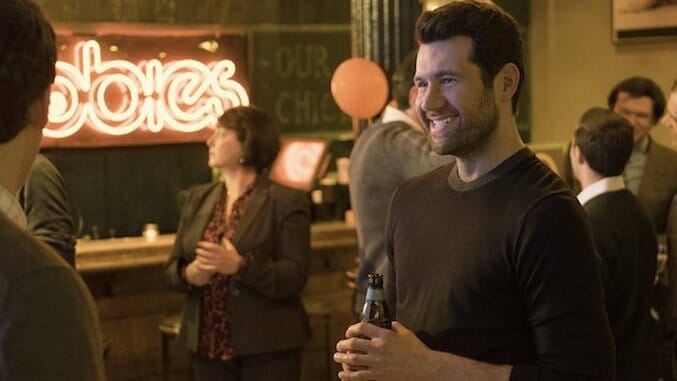Why Isn’t Billy Eichner a Sex Symbol Yet?
Photo: Linda Kallerus/Hulu
In the fourth episode of Difficult People’s third season, Billy Eichner and John Cho make out in the street. What started as a convoluted feud changes gears abruptly when Cho’s ad executive lets slip that Billy is just another “entitled hot actor type.”
“Wait. You think I’m a hot actor type?” Billy asks in surprise. But why the surprise? Can we not just admit that Billy Eichner is sexy already?
Eichner may be best known for his outlandish, aggressive humor on Billy on the Street, but when the id he plays for innocent bystanders fades away, Eichner reveals himself to be quite charismatic. Some of his most fetching features are traditional ones, but his boisterous personality gives them an edge. For all the bitter punchlines and biting tone, he’s actually rather sweet. He jokes about withholding his smile, but when it sneaks out, it’s swoon-worthy.
Never underestimate a man’s ability to wear a suit well, and rest assured that Eichner wears one better than your hottest thirst follow.
Aside from his appearance, Eichner’s persona itself is appealing. Despite the fact that his neuroses and hang-ups are often the joke, he moves with the enviable confidence we tend to demand from our sex symbols. That unapologetically gay personality has helped make him a new comic titan because it’s distinctive, but he also arrives fully self-actualized. Nothing is sexier than someone who knows who the hell they are.
The lack of wide acceptance of his good looks is not for lack of trying. Eichner books magazine spreads and posts shirtless selfies as much as the best of them. Unlike other gay characters, he gets to be seen in a sexual context, like being blown in the gym’s steam room by John Mulaney in Difficult People’s second season—so he has not been neutered like most funny gay men on television. One of his previous Billy on the Street bits even involved asking people whether or not he is hot.
And it’s not because funny men can only be seen as funny. There are enough predominantly funny actors, from Chris Pratt to Donald Glover, that are as equally cherished for their looks as their wit to dispel that idea. But yes, the actors that get to enjoy both kinds of praise are largely straight men (or “straight-acting” gay ones).
Why is it that straight actors can capture our thirst through our funny bone, but someone like Eichner gets omitted from that discussion?
There’s a certain double standard placed on gay comedians that straight men don’t face. Before the culture can decide that you’re both funny and hot, the conversation must place you in one box or the other. And that’s just where the desexualization of a gay jokester begins. Meanwhile, the likes of Pratt are heralded as sexy partly because they are funny.
It’s not just that gay actors aren’t subjected to “this or that” reductiveness in terms of funny-or-hot perceptions where straight actors are allowed to be both. It’s also that gay actors have to adhere to a more masculine stereotype even to be perceived as attractive. Attractiveness and butchness are directly linked in the logic of most popular entertainment, creating the constraint that gay men must appear to be at least a little bit straight to deserve our lust.
Curiously, Eichner’s gayness has been contextualized against heterosexual men, like Cho or Mulaney. One of his early popular gags was educating Conan O’Brien on how to successfully maneuver on Grindr. But the narrative never resorts to “straight goes gay” archaicness because Eichner is acutely aware of the masculine expectation he’s subverting. He controls the joke, and his sexuality stays affirmed.
-

-

-

-

-

-

-

-

-

-

-

-

-

-

-

-

-

-

-

-

-

-

-

-

-

-

-

-

-

-

-

-

-

-

-

-

-

-

-

-








































